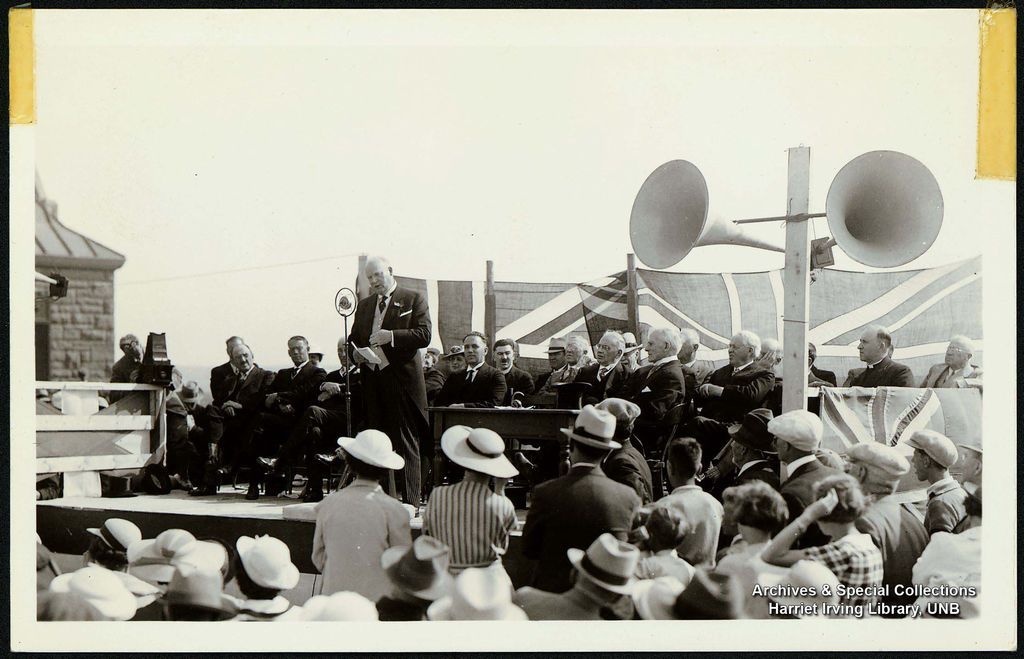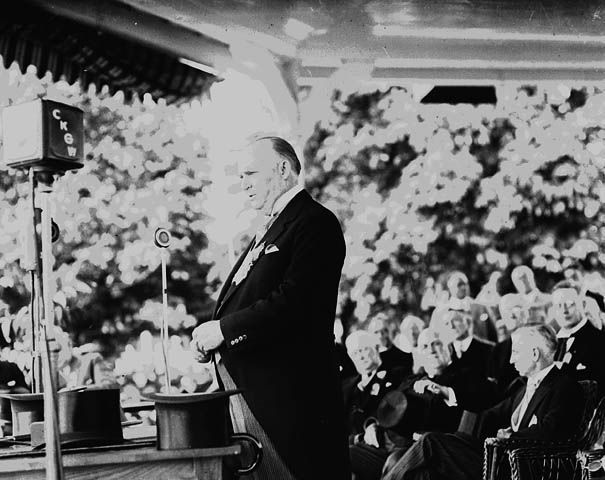On January 2, 1935, R.B. made the first of five radio addresses that would have Canadians listening all across the country. The first address had an estimated 800,000 people tuned in and each subsequent broadcast earned a greater audience.
The five half-hour broadcasts, on January 2, 4, 7, 9 and 11, were called The Premier Speaks to the People. R.B. spoke in Ottawa on CRCO and the broadcast was linked to thirty-eight other stations across the country through the CRBC radio network. Taken together the five broadcasts became known as Bennett's 'New Deal'. R.B.'s brother-in-law, William Herridge, is credited with persuading him to do the radio broadcasts. The total cost for the broadcasts was $11,000 and R.B. paid the whole bill out of his own pocket.
Parliament resumed on January 17, 1935, and the Throne Speech delivered similar ideas to the radio addresses. The plan was that King and the opposition Liberals would vote against the Throne Speech and an election would result where R.B. could campaign on the merits of the 'New Deal'. That didn't happen. R.B. and his Conservatives had to scramble to present legislation and a budget. Two pieces of legislation were introduced to begin the implementation of the 'New Deal': the Employment and Social Insurance Act and the Minimum Wages Act; and began the process of working their way through the House.
On February 23 R.B. fell ill with an acute respiratory infection and was sent to bed. This left his cabinet members to put together a budget and prepare more legislation: the Prairie Farm Rehabilitation Act, another relief bill adding to the previous ones, the Relief and Public Works Construction Act and the establishment of the Economic Council of Canada.
On March 7, 1935, R.B. suffered a heart attack. His doctors ordered complete bed rest.
Another piece of legislation, the Weekly Day of Rest Act, was introduced.
On April 18, 1935, while still recovering, R.B. left to travel to England to attend King George V's silver jubilee. The trip, although official business, was also a much needed rest. Before he left he decided to reinstate the practice of submitting names to the Crown for the bestowal of Royal Honours as a way to recognize achievement.
On May 20, 1935, R.B. returned to his seat in the House of Commons amidst thunderous applause. Another flurry of legislation was introduced: the Criminal Code Amendment Act (dealing with false advertising, minimum wage and predatory pricing), the Creation of the Canadian Wheat Board, the Dominion Trade and Industry Commission Act (detailed a Canada standard for goods thereby establishing the CSA-approved label for Canadian products), the Farmer's Creditors Arrangement Act, the Natural Products Marketing Act amendments, the Dominion Housing Act and the Companies Act Amendment.
On July 5, 1935, Parliament was adjourned. On August 15, R.B. visited Governor General Bessborough and an election was called for October 14.
The 1935 campaign was interesting to say the least. The Liberal platform was surprisingly similar in nature to the legislation introduced by the Conservatives through the 'New Deal'. The Conservative election machine that worked so well in 1930 had now almost completely fallen apart. There was dissention within the party itself.
When Election Day was over there was nothing else to do but reflect in disbelief. No matter what way it is viewed, it was the worst defeat the Conservative party had ever seen. The Liberals rose to a majority government and the Conservatives were reduced to just 39 seats out of the 245 total. R.B. did win his own seat but was the lone Conservative from Alberta.





